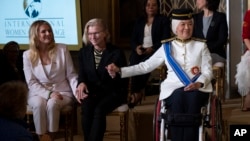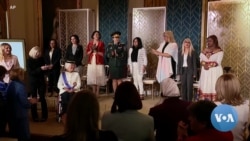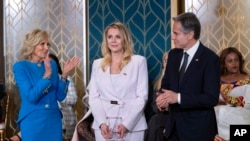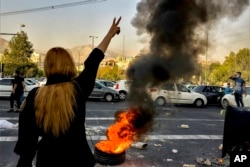U.S. first lady Jill Biden wanted to put this year’s International Women of Courage recipients on the biggest stage possible, so she invited all 11 honorees to the White House on Wednesday for the awards ceremony held on International Women’s Day.
“Girls everywhere need to know that there are women fighting for them and winning,” Biden said Wednesday, speaking before a packed room of guests and honorees gathered for the U.S. secretary of state’s annual award. “Opening doors, transforming schools and communities and governments, building a better world for all of us. And, we’re also here to say to their brothers and fathers and husbands and friends: As much as we need women who are willing to speak up, we need more men who are willing to listen and act.”
For the first time this year, the award also honored a group, naming the women and girl protesters of Iran as the inaugural recipients of the Madeleine Albright Honorary Group Award. Countless women and girls led protests across the nation’s 31 provinces after 22-year-old Mahsa Amini died in police custody in September, allegedly because she was not properly wearing her headscarf.
“The Iranian people — led by women — took to the streets in peaceful protest,” said Linda Thomas-Greenfield, U.S. ambassador to the United Nations, as she announced the award on Wednesday. “They followed in the footsteps of brave women before them, who sacrificed so much in the name of freedom. Through neighborhoods and classrooms, out of apartment buildings and car windows, the protesters chanted throughout Iran and around the world, creating a global chorus demanding gender equality and human rights. … To all the women and girls across Iran, know this: We will continue to stand with you in your fight for women, for life and for freedom.”
Fired, threatened, arrested, tortured
The 11 others — among them journalists, activists, educators, lawyers and a brigadier general — have been fired, threatened, arrested and tortured while seeking justice and equality.
Dr. Zakira Hekmat of Afghanistan had to attend high school in secret, in defiance of her country’s hard-line rulers. She became a doctor, working with refugees. She now lives in Turkey.
Brigadier General Bolor Ganbold flew over her military’s top hurdle, becoming the first female general in Mongolia and that country’s first female staff officer assigned to a U.N. peacekeeping operation.
Professor Daniele Darlan was fired from her nation’s top court after she refused to allow changes to the constitution of her country, the Central African Republic, to allow the president to extend his rule. That and other acts earned her the nickname “Woman of Iron.”
Iranian protesters recognized
White House press secretary Karine Jean-Pierre, who introduced four recipients chosen for their defense of free speech, said the recognition of Iran’s protesters is hugely meaningful.
“We’re doing it right here at the White House, which we think is incredibly important for women around the world, but also women here and young girls here, to hear the stories of these incredible individuals,” Jean-Pierre said, in response to a question from VOA. “Girls everywhere need to know that there are women who are fighting for them."
Analysts say the recognition shows that the Biden administration holds Iran to the same standard as the rest of the world.
“We're three weeks away from the Summit for Democracy, where the administration is calling on countries around the world to reaffirm their support for democratic governance and support for civil society that's pushing for democracy in authoritarian contexts,” Marti Flacks, a researcher who focuses on human rights at the Center for Strategic and International Studies, told VOA.
But the award is unlikely to impress those in power in Tehran, she said. Almost all of the members of the nation’s supreme council are men.
“They will find any opportunity to blame the United States or the West for their own challenges and governing their country,” Flacks said. “I think it's quite clear from anyone following the situation in Iran that this is a homegrown movement. … So I don't think that efforts by the regime to pin this on the United States are going to have much of an audience.”








